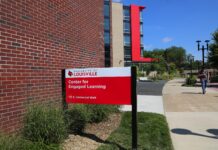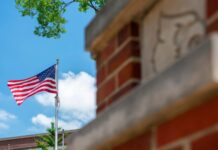LOUISVILLE, Ky.-The University of Louisville is beginning a year-long, campus-wide study of its athletics program as part of the NCAA Division I athletics certification program. The study will cover academic and fiscal integrity, governance, rules compliance and commitment to equity, student-athlete welfare and sportsmanship.
The NCAA initiated the athletics certification program in 1993 to help ensure integrity in institutional athletics programs. All Division I institutions participate. U of L was first certified through the process in 1997.
“The goal of the process is to engage the entire university community in the review of our athletics program,” said U of L Acting President James Ramsey. “It adds to campus awareness and understanding of its strengths and gets people involved in addressing areas of concern.”
Ramsey has appointed a steering committee of faculty, staff, students, trustees and community members to conduct the self-study. Led by Acting Associate Provost Dale Billingsley, the committee will gather information and recommendations through subcommittees on fiscal integrity, academic integrity, governance and commitment to rules compliance, and equity, welfare and sportsmanship.
Each area will be measured against a set of operating principles established by the NCAA, Billingsley said. The steering committee and subcommittees will meet with NCAA representatives on campus throughout the day Friday, Sept. 27, for an orientation on the principles and procedures for the self-study.
“As part of the process, we’ll look at how the activities of the athletics program relate to our institutional mission,” Billingsley said. “We’re interested in conducting a thorough study and will welcome input from the campus community throughout the process.”
The university has established a web site, www.louisville.edu/ncaacert, that will include lists of committee and subcommittee members, regularly updated information about the self-study and opportunities for people to provide input. Billingsley said the university also will host public forums on the draft self-study report after it is completed.
The university anticipates sending the report to the NCAA in August 2003, he added. A team of NCAA reviewers from other colleges, universities or conference offices then will conduct a four-day evaluation visit on campus in the fall.
The external team’s report will be forwarded to the NCAA Division I Committee on Athletics Certification, which will determine the institution’s certification status and announce the decision publicly. Institutions that fail to conduct a comprehensive self-study or correct problems face possible sanctions.
The three options of certification status are certified, certified with conditions and not certified. While universities and colleges have an opportunity to correct deficient areas, those that do not may be ruled ineligible for NCAA championships.
The NCAA is a membership organization of colleges and universities that participate in intercollegiate athletics. Its primary purpose is to maintain intercollegiate athletics as an integral part of the education program and the athlete as an integral part of the student body. The NCAA membership formulates rules of play for NCAA sports, conducts national championships, adopts and enforces standards of eligibility, and studies all phases of intercollegiate athletics.






























